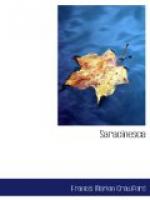“You must have a new gown, my dear,” he said presently, in a conciliatory tone.
His wife passed for the best-dressed woman in Rome, as she was undeniably the most remarkable in many other ways. She was not above taking an interest in dress, and her old husband had an admirable taste; moreover, he took a vast pride in her appearance, and if she had looked a whit less superior to other women, his smiling boast that she was above suspicion would have lost some of its force.
“I hardly think it is necessary,” said Corona; “I have so many things, and it will be a great crowd.”
“My dear, be economical of your beauty, but not in your adornment of it,” said the old man, with one of his engaging grins. “I desire that you have a new gown for this ball which will be remembered by every one who goes to it. You must set about it at once.”
“Well, that is an easy request for any woman to grant,” answered Corona, with a little laugh; “though I do not believe my gown will be remembered so long as you think.”
“Who knows—who knows?” said Astrardente, thoughtfully. “I remember gowns I saw”—he checked himself—“why, as many as ten years ago!” he added, laughing in his turn, perhaps at nearly having said forty for ten. “Gowns, my dear,” he continued, “make a profound impression upon men’s minds.”
“For the matter of that,” said the Duchessa, “I do not care to impress men at all nor women either.” She spoke lightly, pleased that the conversation should have taken a more pleasant turn.
“Not even to impress me, my dear?” asked old Astrardente, with a leer.
“That is different,” answered Corona, quietly.
So they talked upon the subject of the gown and the ball until the carriage rolled under the archway of the Astrardente palace. But when it was three o’clock, and Corona was at liberty to go out upon her usual round of visits, she was glad that she could go alone; and as she sat among her cushions, driving from house to house and distributing cards, she had time to think seriously of her situation. It would seem a light thing to most wives of aged husbands to have taken a fancy to a man such as Giovanni Saracinesca. But the more Corona thought of it, the more certain it appeared to her that she was committing a great sin. It weighed heavily upon her mind, and took from her the innocent pleasure she was wont to feel in driving in the bright evening air in the Villa Borghese. It took the colour from the sky, and the softness from the cushions, it haunted her and made her miserably unhappy. At every turn she expected to see Giovanni’s figure and face, and the constant recurrence of the thought seemed to add magnitude to the crime of which she accused herself,—the crime of even thinking of any man save her old husband—of wishing that Giovanni might not marry Donna Tullia after all.
“I will go to Padre Filippo,” she said to herself as she reached home.




